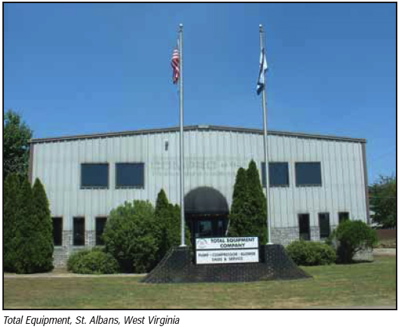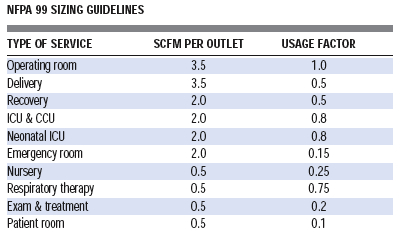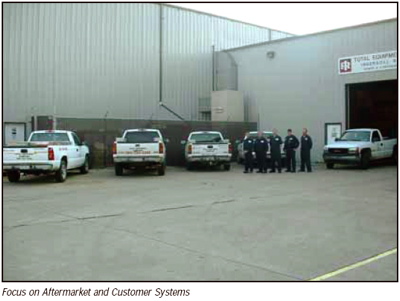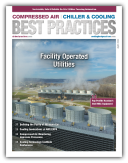Compressed Air Best Practices interviewed Mike Weir (President) of the Total Equipment Company.
When and how was Total Equipment started?
The Total Equipment Company was started in 1982 by two former Ingersoll Rand sales managers. We entered the West Virginia, Western Pennsylvania, and Eastern Ohio markets by acquiring an Ingersoll Rand Air Center in Charleston, West Virginia. Our corporate office moved to Pittsburgh, Pennsylvania and opened a full service shop in 1984.

What is the scope & structure of Total Equipment today?
Currently we have two stocking facilities: St. Albans, West Virginia (15,000 square feet) and Pittsburgh, Pennsylvania (30,000 square feet). We manage by committee with all of our senior salespeople and managers as stockholders. Our management is split between four senior salespeople. While all four of us maintain our own sales accounts, we have assigned specific operational responsibilities amongst us.
What brands of compressed air products does Total Equipment represent?
Ingersoll Rand is our major supplier of air compressors and compressed air components. We also represent Hankison air dryers and filters, Roots blowers, and Dekker vacuum pumps.

How is the hospital market in Pittsburgh? How do you address it?
Within Allegheny County there are aproximately 35-40 hospitals. Just downtown we have ten major hospitals. UPMC (University of Pittsburgh Medical Centers) owns 80% of the hospitals. West Penn Hospitals own another 15% and then there are another 5% of miscellaneous hospitals. We also have VA hospitals here like everywhere else.
We have a market specialist who focuses on all the hospitals in Allegheny County. Total Equipment has also been a member, for many years, of the HESP (Hospital Engineering Society of Pittsburgh). We have attended their monthly meetings for many years and often lead technical discussions on hospital air and vacuum systems with the membership. The real priority, however, is to provide them with top service. Outside of Allegheny County we use our outside sales engineers, who live in the same community, to service the local hospital. Our strong staff, of twenty service technicians, provides the service support required.
What kind of compressed air products does the hospital market use and for what applications?
A good-size hospital with 200 beds and ten operating rooms can have a medical air system, a laboratory air system, and pneumatic air systems. The medical air systems must all follow the NFPA 99 guidelines. We follow these guidelines, from the beginning, when we assess the demand for air in a hospital. For example, you multiply the number of operating rooms times the air-flow (scfm) per outlet times the usage factor, to calculate the scfm needed for operating rooms. Add up all the applications and you arrive at a total scfm required. We then size up a system which can supply the air flow needed – and, per NFPA 99, provide a redundant system to provide the hospital with 100% back-up.

From an equipment standpoint for our NFPA 99 medical air systems, we use only Ingersoll Rand oil-less, reciprocating or scroll air compressors. Oil-less means there is no oil at all in the compression chamber or in the crankcase - or gear area. Air-cooled systems are preferable to water-cooled. Water-cooled systems require chillers and can run-up costs for water and sewage. We estimate that water costs \$11 per thousand gallons in the Pittsburgh region. In some situations, space is a consideration and the installations are in basements where water-cooled is the only option. We therefore recommend air-cooled compressors whenever the hospital has the ability to provide fresh intake air. NFPA 99 Guidelines are very specific on intake air. Intake air must be free of contaminants and special care must be taken to keep it away from loading docks or exhaust. We normally pipe to the roof. A common error we find is that intake piping is undersized. If you undersize the intake piping, you’ll experience rapid cycling and premature wear and tear on the compressor.
Medical air requires 50 psig air pressure. We normally, however, produce air between 80-110 psig as there are typically thousands of feet of piping (of small diameter) in a hospital. With medical air, you must always guarantee enough air pressure and the right air quality.
We install the appropriate NFPA 99 Medical Air Dryers, CO2 monitors and dew point monitors. In 2002, NFPA 99 changed the dew point specification to a +32 F dew point. We normally use Hankison Medical Refrigerated Air Dryers for these applications. We are also seeing membrane dryers, as a viable system up-grade to some older air systems using refrigerated dryers. Membrane dryers offer the advantage that they can offer dew points down to -40 F and do not require any electric connections.
How is laboratory air different?
Laboratory air may not use the same air system as the NFPA 99 medical air system.
Laboratory air normally supplies the research & development areas in a hospital. Specifications often call for oil-free air. This provides us with more options for departments with budget constraints. We can use oil-free and oil-lubricated compressors with appropriate filtration systems. Oil-free air compressors do require filtration since oil is present in the crankcase of the air compressor. If there was a mechanical failure of a seal, oil could end up in the compression chamber and be sent downstream. For this reason, we install over-sized coalescing filters, which could handle an oil slug – in a worse-case scenario. We will also provide oil-free air by installing the appropriate filtration systems after a lubricated rotary screw compressor. Dew point specifications will vary, depending upon the lab, from -40 to +38 F pressure dew points.
How about vacuum?
We recommend liquid-ring, air-cooled, vacuum pumps. We use Dekker vacuum products. We recommend air-cooled over water-cooled products for the same reasons mentioned before. The same areas of a hospital, which use compressed air, use vacuum. Requirements for vacuum are normally at 19-20 inches Hg vacuum per NFPA 99. Many hospitals go to 20-22 inches Hg for extra security.
How is the steel industry? Please explain your experience with the steel industry.
The steel industry is very strong, operating at full capacity. Not much capital spending.
The steel industry is a major consumer of air and has great potential for air surveys, PM (Preventative Maintenance) contracts and dryers and filters. The environment is harsh and requires a knowledge of the ambient conditions with respect to temperatures and dust.
What kind of compressed air products does the steel industry use and for what applications?
Depending on plant size, they use all types from centrifugals to rotary screw and reciprocating. They typically have low power rates thus not a lot of emphasis on high efficiency equipment.
How does Total Equipment practice sales management?
Salespeople report to one of three owners and go to them for support and training. We feel our salespeople should be technically competent. Many are degreed engineers and spend one to two years as an application engineer, learning the products, before going into outside sales. We expect them to spend the majority of their time developing customers and supporting them.
Do you have market specialists in sales?
In addition to being assigned a geographic territory, our salespeople have been assigned specific markets. This market focus allows them to leverage contacts and build knowledge in a specific industry. The markets are:
• Municipal
• Primary Metals (Steel/Aluminum)
• CPI (Chemical & Petroleum industry)
• General Industry
• Mining
• Institutions (Schools/Hospitals)
How does Total Equipment practice product/supplier management?
Senior salespeople are given supplier responsibility and paid a bonus for reaching goals. They are responsible for being the champion of this product line, reaching sales goals, going to meetings, and distributing supplier information.
Total Equipment also sells pumps. How do you handle both pumps and compressed air products?
Total Equipment Company specializes in rotating equipment, particularly equipment which moves compressible and incompressible fluids. Our business is split equally between pumps and compressor/blower/vacuum pumps. Our salespeople and servicemen are expected to know and sell all products. We feel pumps get us into larger accounts and help us develop strong relationships, which keep us in touch with new air compressor needs. Air compressors force us to call on lighter industry, which has fewer pumps. This helps us diversify our markets served.
What do you recommend to end users with regards to their compressed air systems?
Customers need to spend more time analyzing their entire system rather than individual components. We recommend energy and system audits to hone in on the entire air system. This allows the customer to select the most economical components which can be put together to provide the most efficient and reliable system.

How has the compressed air market evolved?
The market has changed a lot since our founding almost 25 years ago. In 1982, we sold compressors, dryers, and parts with little service. Now, almost 50% of our invoicing comes from aftermarket service and parts. We have grown to 80 employees and have an emphasis on aftermarket and customer systems. We have a full service machine shop with complete CNC capabilities and dynamic balancing equipment. The market is constantly changing, and as a small business, we have the capability of being flexible and can change direction quickly. This strategy, combined with our people, has lead to our success as a company.
Thank you Total Equipment for your insights.
For more information please contact: Mike Weir, President, Total Equipment, phone: 412-269-0999 or visit www.totalequipment.com.




